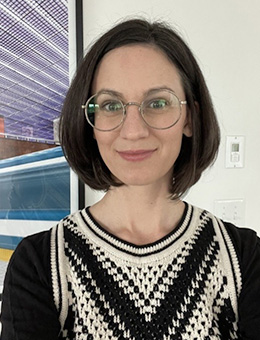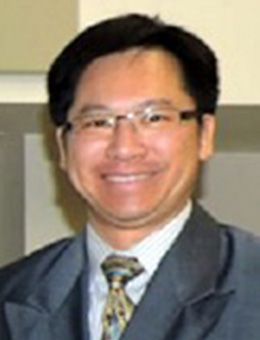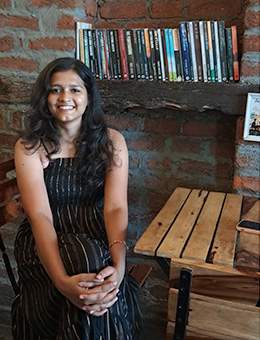This panel will explore the themes of mental health through an analysis of art and architecture. First, Kait Pinder looks at how feelings of intellectual fraudulence often affect women and racialized groups. Pinder analyzes the relationship between fraudulence and authenticity in impostor syndrome, arguing they are mutually dependent, while examining Elaine Hsieh Chou’s novel Disorientation to explore these concepts and their impact on student mental health. Fung will explore how the COVID-19 pandemic has worsened mental health and how work-from-home stresses challenge wellness. Building design, including natural elements, can promote wellness by reducing stress and improving cognition and quality of life. Finally, through a study of Arnhild Lauveng’s memoir A Road Back from Schizophrenia, Arunima A V will explore how the experiences of individuals with schizophrenia are varied and unique based on their social, economic, familial, and cultural backgrounds.
Dr. Kait Pinder, PhD
 Kait Pinder holds a PhD in Canadian literature from McGill University and is now an Associate Professor in the Department of English and Theatre at Acadia University. She is the author of several articles on Canadian modernism and national narratives of compassion, including “Action, Feeling, Form: The Aesthetics of Care in Tracey Lindberg’s Birdie,” which won the 2019 Herb Wyile Prize awarded by Studies in Canadian Literature. In 2023 she published The Contemporary Leonard Cohen, a collection of critical essays about one of Canada’s cultural icons co-edited with Joel Deshaye. She is currently writing a literary and cultural history of the impostor syndrome. Her article “What was failure? What was success?’: The Impostor Syndrome’s Literary Transformations” is forthcoming in Modern Fiction Studies in Fall 2024.
Kait Pinder holds a PhD in Canadian literature from McGill University and is now an Associate Professor in the Department of English and Theatre at Acadia University. She is the author of several articles on Canadian modernism and national narratives of compassion, including “Action, Feeling, Form: The Aesthetics of Care in Tracey Lindberg’s Birdie,” which won the 2019 Herb Wyile Prize awarded by Studies in Canadian Literature. In 2023 she published The Contemporary Leonard Cohen, a collection of critical essays about one of Canada’s cultural icons co-edited with Joel Deshaye. She is currently writing a literary and cultural history of the impostor syndrome. Her article “What was failure? What was success?’: The Impostor Syndrome’s Literary Transformations” is forthcoming in Modern Fiction Studies in Fall 2024.
Abstract: A recent study estimates that up to 82% of people have experienced the feelings of intellectual fraudulence known today as the impostor syndrome (Bravata et al). Usually attributed to women and members of racialized groups (Badawy, Lige et al), “impostor feelings are a significant predictor of mental health” that may intensify “the effects of minority status stress” (Paul 230). Though the impostor syndrome (IS) is not itself a pathology, it describes the distressing and now common experience of feeling like a fraud in educational and professional contexts.
This paper analyzes the vexing relation between fraudulence and authenticity that is implied in the cultural logic of IS. Beginning with the first theorization of IS as the “impostor phenomenon” in 1978 by Clance and Imes, discussions of it have regularly invoked authenticity as the other of intellectual fraudulence––and its antidote. For example, Clance and Imes recommend that those who feel like impostors should “seek out people who will support them in their struggle to be authentic” (246). More recently, in her Jungian theory of IS, Susan E. Schwartz argues that the experience of impostorism “comes at the expense of authenticity” (7). While scholars now critically position IS within the history of American psychology (c.f. Simmons), authenticity often remains undefined, decontextualized, and uncritically endorsed in the same discussions.
Rather than assuming that authenticity and fraudulence are opposites, this paper positions them as mutually dependent and part of the same worldview––just as feeling like an impostor implies knowledge of authenticity, so the authentic self is defined in part through its understanding of inauthenticity. This argument is developed in theoretical and literary terms. In particular, the essay reads Elaine Hsieh Chou’s 2022 novel Disorientation for its meditation on the interconnections between authenticity and fraudulence within academic fields and for its representation of how both concepts affect the mental health of students. In doing so, the paper demonstrates the role literature and literary studies can play in understanding the cultural history and conceptual nuances of IS while also provoking new answers to questions about how best to serve students who feel like frauds.
Phil Fung, MSc.
 Phil Fung is a Consulting Engineer (Energy and Sustainability) in Ontario, Canada. Phil holds several professional designations including LEED Accredited Professional BD+C, Certified Sustainable Building Advisor, Certified Energy Manager, Living Future Accreditation, and Certified Building Commissioning Professional. His areas of expertise are energy-efficient and sustainable building design, nature-inspired regenerative buildings design, energy modeling and LEED project Management. Starting his career as an Automation and robotics Engineer, Phil founded SRS Consulting Engineers in 1999 to provide professional engineering services in energy and sustainability. Using nature as a mentor and tool, Phil developed Bio-Regenerated® Design concepts and products – ReGen® Farm and Shelf - based on biomimetic, biophilic, and bio-synergistic design principles. In 2023, Phil’s Zero Energy Food Shed was placed second in the Professional Engineers Ontario York Chapter Research Project of the Year Award. Furthermore, Phil was awarded research grants from NESERC through Humber College in 2021 and 2023.
Phil Fung is a Consulting Engineer (Energy and Sustainability) in Ontario, Canada. Phil holds several professional designations including LEED Accredited Professional BD+C, Certified Sustainable Building Advisor, Certified Energy Manager, Living Future Accreditation, and Certified Building Commissioning Professional. His areas of expertise are energy-efficient and sustainable building design, nature-inspired regenerative buildings design, energy modeling and LEED project Management. Starting his career as an Automation and robotics Engineer, Phil founded SRS Consulting Engineers in 1999 to provide professional engineering services in energy and sustainability. Using nature as a mentor and tool, Phil developed Bio-Regenerated® Design concepts and products – ReGen® Farm and Shelf - based on biomimetic, biophilic, and bio-synergistic design principles. In 2023, Phil’s Zero Energy Food Shed was placed second in the Professional Engineers Ontario York Chapter Research Project of the Year Award. Furthermore, Phil was awarded research grants from NESERC through Humber College in 2021 and 2023.
Abstract: One in four Canadians are socially isolated, lonely or both (Menec et al., 2020) while one in three will experience an anxiety disorder (NCS, 2007). As a result, they risk poor health outcomes such as coronary heart disease (Valtorta et al., 2016) and dementia (Fratiglioni et al., 2004). The COVID-19 pandemic has amplified risks to wellness with half of Canadians experiencing worsening mental health (Angus Reid Institute, 2020). Wellness is also challenged by work-life stresses emerging as more people work from home (Como et al., 2021). Building design and home environment therefore have a pivotal role in promoting occupant wellness (see Mujan et al., 2019 for review). Documented therapeutic benefits of inbuilt natural elements like window views, indoor living plants and even artificial scenery, include: Faster recovery from illness (Park et al., 2004), improved cognition (Yin et al., 2018), higher work productivity (e.g., Hahn et al., 2020), lower stress (Yin et al., 2018), and higher perceived quality of life (e.g., Dravigne et al., 2008). These positive effects of natural elements on human physical, mental and emotional well-being are collectively termed biophilic effects. Although 60% of builders considered occupant health and well-being a decisive factor (CGBC 2020) to home buyers, knowledge of how to effectively deploy biophilic interventions is limited. To make interventions evidence-based and practicable, we sought to answer several questions that have been largely unaddressed by researchers: (1) What kinds of features are potentially the most effective for improving well-being?; (2) what measures of well-being are most affected by features?; (3) what levels of exposure are most effective?; and (4) what demographics would benefit most from architectural features as interventions? Insights into these questions would empower architects to prioritize features in their designs that are most likely to work. This research project was funded by NSERC.
Arunima A Vasudevan, MA.
 Arunima A V is a PhD scholar in the Department of English Literature at English and Foreign Languages University, Hyderabad. She completed her M.A. in English from Jawaharlal Nehru University, New Delhi. Her research interests include Health Humanities, Cognitive Humanities, Gender and Sexuality.
Arunima A V is a PhD scholar in the Department of English Literature at English and Foreign Languages University, Hyderabad. She completed her M.A. in English from Jawaharlal Nehru University, New Delhi. Her research interests include Health Humanities, Cognitive Humanities, Gender and Sexuality.
Abstract: It is a widespread notion that schizophrenia robs the individual of his or her rationality, and autonomy. In addition, they are deemed vulnerable and assumed to need a controlled environment where their actions are supervised and often restrained. On the contrary, resilience is considered the resistance to stress and strength to overcome life's challenges rationally. It is characterised by adaptability and stability in the adverse states of events. Hence, according to the common understanding, schizophrenia has to be devoid of resilience. However, Susan Sumskis and Peter Caputi argue that the experiences of individuals with schizophrenia are varied and unique based on their social, economic, familial, and cultural backgrounds. Therefore, they argue that people with high resilience have proven to recover since the system also contributes to the patient’s vulnerability. This system includes the medical, social, and familial members and their approach towards individuals with schizophrenia speaks volumes about the resilience of a society. In this context, I propose to study A Road Back from Schizophrenia: A Memoir, written by Arnhild Lauveng as a testament to the resilience of a person with schizophrenia. She recovers from schizophrenia owing to her deep self-reflections and a supporting system. Hence, I contend that resilience is a variable influenced by several factors and having schizophrenia alone cannot deprive the individual of it. Through this paper, I intend to demonstrate how Lauveng embodies resilience in the face of challenges like delusions, hallucinations, and other crippling effects of the illness. I would also argue that resilience can be a collective phenomenon where the system proves efficient in dealing with the stress caused to the individuals, hence uplifting society as a whole. Therefore, I aim to propose that schizophrenia has inconsistencies with rationality, autonomy, and resilience, and there are instances when these positive attributes of the patient override the symptoms within a favourable system.
